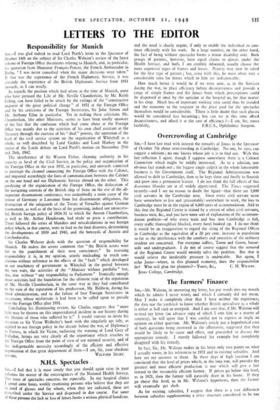N.H.S. Spectacles .
StR,—I feel that it is most timely that you should again raise in your columns the matter of the extravagances of the National Health Service. The issue of spectacles concerns me especially. In my hospital clinics sPend some hours weekly examining persons who believe that they are in need of glasses and for whom, when they Itre indicated, these are Prescribed under the Service and dispensed in due course. For some of these persons the lack or loss of lenses forms a serious physical handicap, and the need is clearly urgent, if only to enable the individual to con- tinue efficiently with his work. In a large number, on the other hand, the fact of being without spectacles forms a minor disability only. Both groups of patients, however, have equal claims to glasses under the Health Service, and both, I am credibly informed, usually choose the more expensive types of frames and lenses. Priority may now be asked for the first type of patient ; but, even with this, he must often Wait a considerable time for lenses which to him are indispensable.
How much better it would be if we were now, as in the Services during the war, to place efficiency before decorativeness and provide a range of simple frames and flat lenses from which prescriptions could be dispensed at once by the optician at the hospital or, for that matter in his shop. Much loss of important working time could thus be avoided and the economy to the taxpayer in the price paid for the spectacles themselves would be considerable. There is little doubt that such glasses would be considered less becoming ; but can we at this time afford decorativeness, and afford it at the cost of efficiency ?—I am, Sir, yours


































 Previous page
Previous page